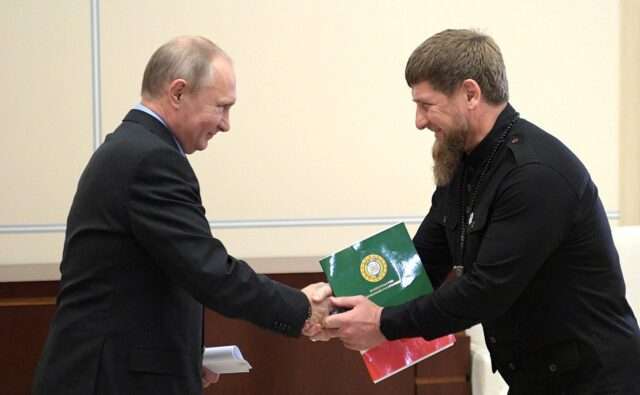Chechen Leader Ramzan Kadyrov: A Key Ally in Putin’s Fight Against Prigozhin and Wagner PMC

Kavkaz Files ISSN 2975-0474 Volume 17 Issue 4
Author: Giuliano Bifolchi
The orchestrated military rebellion, led by Evgeny Prigozhin, against the central authority in Russia, presents an opportunity for Ramzan Kadyrov, the Chechen leader, and his military troops to emerge as significant allies and actors in the Kremlin’s domestic policy landscape.
Recent developments in Russia have brought attention to an attempted armed rebellion orchestrated by Evgeny Prigozhin’s Wagner Private Military Company (PMC). The Federal Security Service (FSB) started a criminal case against Prigozhin, charging him with inciting an armed rebellion, a move supported by the Prosecutor General’s Office of the Russian Federation.
President Vladimir Putin addressed the nation, emphasising the need to set aside internal strife during this critical period and expressing his determination to neutralise the rebellion’s organisers with firm action.
Ramzan Kadyrov and Chechnya’s Military Support to Vladimir Putin
Ramzan Kadyrov, the leader of the Chechen Republic, expressed his support for Russian President Vladimir Putin through his Telegram channel. Kadyrov condemned the events as a betrayal and a military mutiny, emphasising that war is not the time to voice personal grievances or resolve disputes. He highlighted the importance of maintaining calm and reliability in the rear, considering the challenges faced by soldiers on the front lines.
The Chechen leader underscored the significance of stability, state cohesion, and citizen security, cautioning that such actions can lead to bloody consequences. He highlighted the role of the Supreme Commander-in-Chief, who is elected by the people and possesses a comprehensive understanding of the situation.
In conclusion, Kadyrov fully supported every word of Putin’s address to the nation, echoing the President’s characterisation of the events as a military rebellion. He emphasised that there is no excuse for such actions and expressed his unwavering endorsement of Putin’s decisions as the Supreme Commander-in-Chief.
Meanwhile, according to multiple Telegram channels, Chechen troops have reportedly arrived in the Rostov-on-Don area.
Geopolitical Analysis
Ramzan Kadyrov’s support for Vladimir Putin serves as a confirmation of Chechnya’s vital role in both domestic and foreign policy. By aligning himself with the Kremlin, the Chechen head of state highlights the significance of his republic in shaping Russia’s political landscape.
The potential involvement of Chechen military personnel in opposition to the Wagner Private Military Company presents a stark contrast to the presence of Prigozhin’s contractors in Rostov-on-Don. This move, however, carries the risk of a significant clash between opposing factions. The consequences of such a clash could extend beyond the immediate area, impacting the city and the surrounding region.
The outcome of Chechen military support against Prigozhin’s threat will heavily influence Ramzan Kadyrov’s appeal and importance within the country. If the Chechen forces prove decisive in countering the threat, Kadyrov’s stature will undoubtedly grow. We have observed a similar pattern in the past, such as in Mariupol and the early stages of the Ukraine conflict, where Chechen forces and Ramzan Kadyrov emerged as key supporters of the Russian Federation.
Ramzan Kadyrov’s continued support for Vladimir Putin underscores Chechnya’s ongoing significance in shaping Russia’s domestic and foreign policies. As events unfold and Chechen military involvement against Prigozhin’s forces becomes clearer, we will acquire a better understanding of the impact this will have on Kadyrov’s influence and importance within the country. History has shown that Chechen forces, under Kadyrov’s leadership, have played a prominent role in supporting the Russian Federation in times of the Ukraine conflict, further solidifying their position as key supporters.
Update at 15:30 AM CET: This report has been updated to reflect the latest developments surrounding the armed rebellion or mutiny involving the Wagner PMC. For further information or analysis about the Russian Federation and the Republic of Chechnya, contact us at info@specialeurasia.com.
Do you like SpecialEurasia reports and analyses? Has our groundbreaking research empowered you or your team? Now is your chance to be a part of our mission! Join us in advancing independent reporting and unlocking the secrets of Eurasia’s complex geopolitical landscape. Whether through a one-time contribution or a monthly/yearly donation, your support will fuel our relentless pursuit of knowledge and understanding. Together, let’s pave the way for a brighter future. DONATE NOW and secure your place in shaping the geopolitical narrative.
